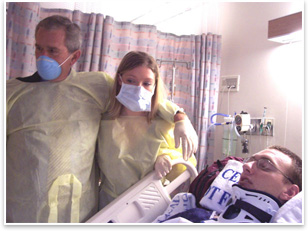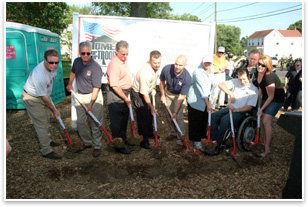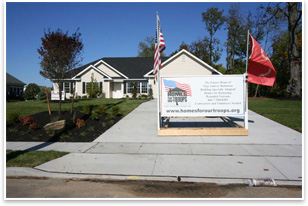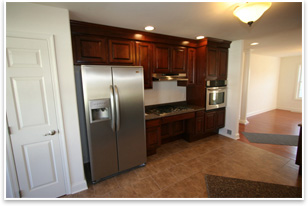
 In
Appreciation of Our Veterans In
Appreciation of Our VeteransJarmel Kizel Architects designs barrier free home for wounded Iraq vet Summary: Homes for Our Troops erected a new barrier-free home for Marine Staff Sgt. Andrew Robinson and his wife, Sara. Justin Mihalik, AIA, treasurer of AIA New Jersey, got involved pro bono to “give back.” Marine Staff Sgt. Andrew Robinson is one of many Americans who have been seriously wounded fighting the wars in Iraq and Afghanistan. In 2006, while on patrol in Iraq’s Al Anbar Province, he was injured when an IED detonated. Robinson’s injuries included fractures to his lower legs, collapsed lungs, and a fractured vertebra that left him paralyzed from the chest down and with partial paralysis in his arms. Still, he was lucky. The bomb ripped off the front half of the truck and killed the driver, vehicle commander, and turret gunner.
To help Robinson and his wife, Sara, adapt to the changes in their lives, Homes for Our Troops, a nonprofit organization that provides accessible homes for severely injured service members, erected a new barrier-free home for the couple in Burlington, N.J. On November 10, 2008, the Robinsons moved into the 2,100-square-foot house, designed to assist Robinson in moving about freely and independently. The four-bedroom home was designed by Jarmel Kizel Architects and Engineers and built by hundreds of volunteers over five months using a grant from the Injured Marines Fund and other contributions. Most of the house went up in three days with volunteer labor, including some from Heart 911, a group of first responders from the World Trade Center attacks.
“Partly what drove me to work with them is that two of our employees are vets,” recalls Mihalik. “They both served in different wars, so it really hit home for us to see this as an opportunity to do a pro bono project and give back.” In order to accommodate Robinson’s wheelchair, Mihalik designed the ranch style house with an open floor plan and wide corridors. Small rooms such as bathrooms are larger to allow space for a wheelchair to maneuver. Kitchen and bathroom counters are lower, with wheelchair knee spaces under the stove and sinks so that Robinson can care for himself with greater ease. The house also features automatic doors, an elevator that provides access to the basement, and a lift system in the master bedroom that can carry Robinson from the bedroom to the bathroom without him having to get in his wheelchair.
In a letter of appreciation to Homes for Our Troops, the Robinsons wrote: “This is more than a house to Sara and me. This is the place where I will study and earn my college degree. When we eventually have children, this is the home we’ll bring them to. This is where we will make a ton of memories. This home will always be a testament to the goodness of people and their support of injured veterans and their family members. Thank you is not a good enough response for what you have all done.” |
||
Copyright 2009 The American Institute of Architects. All rights reserved. Home Page |
||
news headlines
practice
business
design
recent related
› Intrepid Fallen Heroes Fund Donates Burn and Amputee Center to the Army
› Paralyzed Veterans of America Honors Chicago-based Access Living for Accessible Design
To volunteer your design work or contribute to Homes for Our Troops, visit their Web site.
Captions
1. President Bush visits the Robinsons in the hospital.
2. Homes for Our Troops groundbreaking for the house.
3. The completed home.
4. The wheelchair accessible kitchen.
Photos courtesy Homes for Our Troops and Andrew Robinson.

 Robinson passed seven painful months in the hospital undergoing
several major surgeries and still continues an aggressive rehabilitation
regimen, but that hasn’t affected his positive outlook and
vigorous appreciation for life. In fact, he recently competed in
a 10-kilometer race associated with the Marine Corps Marathon on
a specially adapted hand-cycle.
Robinson passed seven painful months in the hospital undergoing
several major surgeries and still continues an aggressive rehabilitation
regimen, but that hasn’t affected his positive outlook and
vigorous appreciation for life. In fact, he recently competed in
a 10-kilometer race associated with the Marine Corps Marathon on
a specially adapted hand-cycle. The architect was introduced to the project by client Charlie Kojeski
of the Kojeski Construction Co. in Voorhees, N.J., which led the
home-building effort. Justin Mihalik, AIA, principal at Jarmel Kizel
and treasurer of AIA New Jersey, modified prototypical home
plans provided by Homes for Our Troops to meet local site conditions
and the New Jersey building code.
The architect was introduced to the project by client Charlie Kojeski
of the Kojeski Construction Co. in Voorhees, N.J., which led the
home-building effort. Justin Mihalik, AIA, principal at Jarmel Kizel
and treasurer of AIA New Jersey, modified prototypical home
plans provided by Homes for Our Troops to meet local site conditions
and the New Jersey building code. Although not an IPD project, Matt Jarmel, AIA, principal, Jarmel
Kizel says that the entire design and construction team worked together
to make this project as easy and uncomplicated as possible. Adds
Mihalik: “Even with the township, they really worked well with
the contractor so instead of having some of the typical problems
that you might have on a project, I think everybody realized what
it was about and worked to make it happen and be as smooth as possible.”
Although not an IPD project, Matt Jarmel, AIA, principal, Jarmel
Kizel says that the entire design and construction team worked together
to make this project as easy and uncomplicated as possible. Adds
Mihalik: “Even with the township, they really worked well with
the contractor so instead of having some of the typical problems
that you might have on a project, I think everybody realized what
it was about and worked to make it happen and be as smooth as possible.”